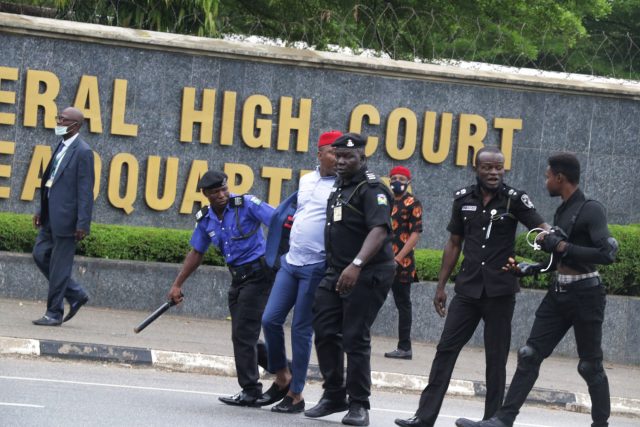Nigerian policemen arrest two men at the Federal High Court, Abuja, where the trial of the leader of the Indigenous People of Biafra, Nnamdi Kanu, is holding.
Nigerian authorities on Monday restricted media coverage for the trial of Indigenous People of Biafra (IPOB) leader Nnamdi Kanu in court.
Kanu is facing treason and other charges which are connected to his call for the secession southeastern region of Nigeria.
On June 29, Nigerian authorities announced the rearrest of IPOB leader Nnamdi Kanu who jumped bail in 2017 after his first arrest in 2015.
There was heavy security Monday morning at the Federal High Court, Abuja, where the trial is being held. Kanu was brought into the court premises in a convoy at about 8 am.
However, most journalists are barred from entering the courtroom as government officials have reportedly selected a few reporters to witness the trial.
‘Media restriction violates fair hearing’ Amnesty International in a tweet condemned “Nigerian authorities’ restriction of the number of journalists that can report the trial of the leader of Indigenous People of Biafra (IPOB) Nnamdi Kanu, which started today in Abuja.”
The rights group said “selecting few journalists to cover the trial is a restriction on access to information and an attempt to deny people the right to know. It also violates all fair hearing guarantees.”
Amnesty International called on the Nigerian authorities to respect the right to a fair hearing and immediately lift the restriction and allow the media unhindered access to the court to do their job.
“This is yet another bizarre and unacceptable attack on the Nigerian media that must not stand,” Amnesty International said.
A Nigerian lawyer Abdul Mahmud said the restriction “is just disgraceful, coming from the judiciary.”
Mahmud tweeted the image of a document that contains 10 journalists, mostly from government-owned media houses, accredited to witness the IPOB leader’s trial.
“This accreditation nonsense not only muzzles media right under Section 22, it also flies in face of open trial guaranteed by Section 36(3) and (4) of the Constitution 1999,” Mahmud said.

